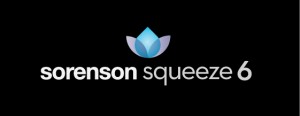I recently had a need for video compression software. I was working on a side project, that involved compressing video and releasing it online.
I tried many different pieces of freeware and they all came up short. They were either too complicated, or didn’t quite do a good job. I settled on Sorenson Squeeze 6. I have had experience with one of the earlier versions and remember it being pretty nice to use and the results were pretty good (i.e. relatively small size for high quality video).
So I checked them out, being that it is a small project I was not on the market for anything TOO expensive. $800? No way. I continued searching for a free/cheaper alternative but with all the demos I downloaded, they always came up short. I decided to bite the bullet and get it.
Got it, worked beautifully. It’s an awesome product…really. It’s very intuitive, very powerful and has MANY settings. I used it for IdeaTin and decided that I should really get around to resizing all my home videos. Yes, all 700GB of them. Every single HD tape that I rip is about 30GB. I definitely don’t need ‘HD’ quality, but I never got around to figuring out how to reduce the size of my library. Now that I have Squeeze 6, I can finally tackle it in a sane way. To Sorenson’s credit, I emailed them telling them about my project and that the $800 price is too steep (also that I found Squeeze 6 at another online store for $200 cheaper). They refunded me $200 off the purchase price, no questions asked. I was pleasantly surprised.
I have a Windows 7 machine, 1 iMac + 1 Macbook Pro. The idea was that given the size of the library, I would have it running on all three machines at the same time to reduce the total amount of time spent re-encoding the library. Got it installed on the MBP and Windows 7 machine fine, no problems.
Tried to install on the iMac, no can do. Contact customer support, they say 1 Serial Number, 1 machine. Ok, I get such a policy in business environments (mid-size to large companies anyway). I get it for Operating Systems, where it is the core of the system. The very foundation of the computer.
But for a home/small business, where people realistically own multiple machines, and for an application designed to do ‘heavy-lifting’ (where having multiple machines running at the same time will reduce the load) this policy should be re-evaluated. I get that there might be technical challenges with detecting who is telling the truth and who is trying to scam you, but I would be willing to bet that these types of policies turn off more legitimate users than deter pirates. If I were to pirate any software, I can install it on as many machines as I like. If it doesn’t work, I don’t have to use it and have no buyer’s remorse. If I buy software and it doesn’t do what I want, or there are restrictions (especially for the more expensive variety), having buyer’s remorse is the software company’s worst enemy.
In this case, Sorenson might be better served at least waving it for those that have a legitimate reason – what is the marginal cost of issuing one more serial number to someone that owns a small business or is using your software at home and has bought your software? Nothing. You don’t have to contact the customer, they will contact you. You don’t have to ship any new CDs or any new documentation. A simple email would suffice.
An alternative route that Sorenson could take is, build an ‘add-on’ application that comes with the software (free) for this particular use case. If you want to restrict me to just using it one or two machines, fine. But have an ‘applet’ that allows me to install a small app on additional computers that allow me to just do a single function (run batch encoding while the main machines are also running – or some variation thereof).
For all software makers out there, it might be beneficial in the short-term interest of the company to restrict the use of your software in ways YOU deem it appropriate to be used, but you simply risk diluting your brand equity in the long term. Imagine you buy a BMW and they tell you where you can drive it or who you can lend your car to.
Oh, and Sorenson, I know that when I bought your software I ‘agreed’ to these terms in the EULA. No need to throw it in my face when I am inquiring about them with your customer support. Your EULA should be protection against fringe cases, an escape of last resort. Not the first line of defense.
Hi Marc,
Per your user agreement, you are only allowed one activation per license. If you would like more information on purchasing a license for multiple users, contact [email protected].
Thank you,
Here is to wishing that software companies will wise up and start allowing customers to do what they want with their software, once they take your money.
